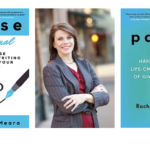Business blogging has passed the tipping point. Today, executives and professionals in the media, marketing, technology and public relations industries get much of their information from blogs and strategize about how to incorporate blogging into their marketing, advertising and communications campaigns.
Debbie Weil, author of “The Corporate Blogging Book,” says “Whether or not you choose to launch a blog, you need to be reading blogs. Your employees and/or competitors are most likely already blogging about your industry niche — or possibly your company, products or services. Get used to it. Make use of it. Track what’s being said about your company in the blogosphere and you’ve just discovered next-generation focus groups.”
But many questions remain. How should your company participate? How do you manage comments on other blogs? If you and/or your company already have a blog, how do you improve it editorially? How do you build readership? How do you improve its effectiveness? Or, if you are a journalist, how as an entrepreneur can you build your own publishing business? In sum, what are the best practices for blogging for business?
This article features 10 blogging tips from 10 experts, including luminaries such as John Battelle, Om Malik, Joseph Jaffe, two business blogging consultants and up-and-coming bloggers, who have generated new business or increased awareness of their brands. It is a “best of the best” in business blogging best practices. Most importantly, in the spirit of blogging, I hope YOU the reader add your comments on my blog as well as take detours to the (what I hope are) helpful links that I have included.
Plan, plan, plan, then plan
When I first launched my blog, a friend passed this helpful Guide to Business Blogging along to me. In it, Peter Flaschner of the Toronto-based consultancy The Blog Studio provides a simple yet comprehensive roadmap of what you need to do before you launch your blog. The bottom line: Plan everything ahead of time by answering the following essential questions:
- What goals do you want to accomplish by blogging?
- How much time and money will it require?
- What do you want to write about?
- What information do you want to share apart from the content (e.g. links, business profiles or resumes on personal blogs)?
- What technology do you want to use?
- How should the design reflect your company/people?
- How should you promote this site?
Apart from having all of those essential elements of the blogging plan outlined, one addition that blogger Jeremiah Owyang (whom you will meet later in the article) would add is to “Figure out a ‘fire team’ strategy for how to handle bad news, company crises or blog flamers.
Focus on what you know best
Of all the businesses affected by blogging, the media business arguably has seen the most change. Om Malik wrote for Business 2.0 until it was shut down by Time Inc. in October, 2007. Today he runs his own blog — one of the most read in Silicon Valley and the technology world — GigaOm. Malik encourages bloggers to “Focus on what you know best. If you take a scattershot approach [about the content], then you are going to have a hard time convincing readers to come back. Your audience/readers are coming to you for analysis and the ability to provide context to the news.”
Now that Malik runs his own publishing company, he says, “The challenges are manifold — worrying about traffic, keeping quality high and finding an ad-supported network. It is not easy, but then being on your own is never easy. I think the best thing we did is what media has done for years: separate business and editorial operations.”
By separating church and state, Malik avoids the conflict of interest that bloggers face by wearing many hats. While they want to write great content, they also want to increase their page views, advertising revenue and/or marketing exposure, which can, if not managed, conflict with providing the reader/consumer with accurate information.
What has his blog enabled him to do that he couldn’t do in the print world? “I would say the blog gives me a closer touch with my readers and they constantly fine-tune my thought process. That was harder in the slower print publication format [at Business 2.0].”
Listen to your readers, and focus on leading a conversation that feeds them.
While some bloggers want to start their publishing business, others want to focus on writing the content and leave the ad sales to someone else. That is why John Battelle, the former editor of Wired and The Industry Standard, started his company Federated Media, a network of 140 blogs in 10 content categories. Battelle says, “Not every great author also wants to be a great publisher.” He advises bloggers that enter his network to “Listen to your readers, and focus on leading a conversation that feeds them.”
Battelle writes his own Search Blog, which is part of the Federated Media network as well. He is enthusiastic about what he can do through blogging that he could not have done as an editor at Wired. What exactly? Batalle says, “So many things. First, total control. Second, a deep and meaningful relationship with real readers. Third, flexibilty in cadence, schedule, etc. And much much more.”
In practicing what he preaches, Battelle says that at least half of his ideas for his best-selling book “The Search” came from his blog, while approximately 30 percent of the book was drafted on his blog.
In conjunction with his advice to bloggers, Battelle recommends that marketers follow a similar path where they listen to their customers and constituents online in something he calls Conversational Media.
Focus on relationships, not rankings
Christina Kerley, who as a solopreneur runs her own marketing consultancy, CK Epiphany, says, “In my blog, I focus on the value of my contacts rather than how many people read my blog. And in so doing, I’ve not only increased my readership but also my cadre of professional relationships. Now I have top authors and best-in-class professionals as colleagues and these relationships have led to opportunities spanning client work, speaking engagements, media articles and VIP events. Conversely, had I merely focused on ‘how popular my blog was’ through rankings, I would have missed out on the true value these two-way, targeted technologies afford us.”
CK focuses on creating value for her readers by sharing marketing best practices through her blog posts and leading the first-ever online marketing book club (with Marketing Profs) where more than 1,000 members spanning six continents discuss different books with the authors and fellow members. CK says, “We’ve featured the authors of ‘Citizen Marketers,’ ‘Made to Stick,’ even work by the venerable Al and Laura Ries. The value is that members are able to ‘speak’ directly with the authors and discuss and debate new principles and theories with professionals from all over the globe and meet new colleagues.”
By building relationships with other bloggers, your blogroll will grow and your traffic will follow.
How does she utilize the feedback from her blog? CK developed a “value collage” with the responses from the question, “What is the single greatest point of value you receive from blogging?” She presents the overview of blogger responses to clients, and it has been covered in trade media and across hundreds of blogs.
Spend at least as much time commenting on other blogs as you do writing your own.
Through his blog, the Marketer’s Studio, David Berkowitz has established credibility for his consulting client strategy work at 360i (where he is director of emerging media) and obtained numerous speaking engagements at the Consumer Electronics Show, the Magazine Publishers of America and MediaPost’s Search Insider Summits and OMMA events. In addition, it has also opened up a means of conversation with other bloggers.
Berkowitz says, “Recently, I offered another perspective on a post Forrester Research’s Jeremiah Owyang blogged about Twitter (on his personal Web Strategist blog), and the exchange led to MarketingProfs inviting us to debate the issue on a new podcast the company was launching.
“Ultimately, these conversations and connections, and at times enduring friendships, that I’ve established through blogging have provided the most value, and then everything from speaking engagements to deeper client relationships have been added perks on top of that.”
What are the benefits of spending time reading and commenting on other blogs?
- Bloggers whose blogs you comment on notice you
- Commenters on those blogs notice you
- It brings you into those other blogs’ communities; you’ll often notice the same commenters over and over each day
- Usually, you can link to your blog from the comment, which is great both for traffic and potentially for search engine optimization
- You gain new ideas to write about; you might take a comment you left for someone and use that to build another blog post of your own that fleshes it out
Find your authentic voice
Joseph Jaffe, who blogs at Jaffe Juice and wrote the book “Life After the 30 Second Spot,” says “There is so much competition/clutter right now. You need to be able to bring something unique to the table.”
Through his blog, Jaffe has found speaking engagements, new business leads for his marketing consulting business, Crayon, and has been called upon for high profile media interviews, including CBS Evening News, ABC World News, Bloomberg, NPR, The Wall Street Journal, New York Times, Fortune, Newsweek, Ad Age and Ad week.
“Join the Conversation,” Jaffe’s most recent book, came out two months ago, utilizing content from posts on his blog that he had written over the past two years. Edited using collaborative wiki software, the cover features photos of the many collaborators for the book and reflects the enthusiasm that Jaffe tapped into from his community and fan base of readers.
“I always was mindful of when a post could be carried over to the book, but for the most part I just went back over the hundreds of posts to find illustrations and relevant inspiration to include in the book. What I did do was not just carry over content from my posts, but also acknowledge and credit commenters who added and built on the various posts/stories.”
Jaffe practices what he preaches, encouraging his clients to experiment with new and different marketing techniques. His new book is no exception. On the “Join the Conversation” wiki, he writes…
“This is an opportunity to show that even a book can be as engaging and collaborative as two people sharing a cup of coffee together or two avatars practicing a bit of synchronized flying.
- · It begins with letting go of control
- · It continues with trusting my community
- · It ends with… no it doesn’t; it never ends…”
Choose the right corporate blogger
Do you know anyone who has gotten a job through his or her blog? Jeremiah Owyang was recently hired as a senior analyst at Forrester research because of his blog. Before that, his boss at PodTech.net found him through his blog as well.
Debbie Weil, a blogging consultant who blogs at Blog Write for CEO’s, says “Think of a blog as the 3D version of your expertise. It’s the online version of You, Inc. It’s a microsite where you can showcase your thinking and writing skills.”
Among his 1,000+ posts, Owyang wrote a comprehensive list of business blogging best practices, which includes a number of good recommendations for choosing your corporate blogger. Here are some of his best recommendations.
- An ideal blogger is someone who is already online all the time, consumes mass info and exports mass info.
- Consider your official corporate blogger to be an individual that already faces customers or the public. Often individuals that do a lot of speaking to the industry on behalf of the company are ideal.
- Your corporate blogger should be interesting as well as informative. No one wants to read a boring blog, but mere entertainment only lasts a few visits.
- The blogger should be an expert of the topic at hand.
- If you have multiple [blogging] strategies, consider having multiple bloggers that focus on each of the areas.
- Only consider bloggers that have the time to commit to blogging, and can do so on a regular basis.
- If you’re in a company where it may be hard to find regular bloggers, consider making a blog ‘pool’ or a general blog site that’s not attached to an individual blogger. GM Fastlane has multiple authors in its blog setting.
- Have a kickoff ‘best practices’ and ‘strategy’ meeting with your corporate bloggers. Have updated meetings and training later.
Who at your company would be the best blogger? And which department should manage it? Bloggers wear many hats and communicate to a number of diverse constituents as described in this article. The roles a successful blogger need to fill include: writer, editor, producer, analyst, technology expert, programmer, SEO expert, marketer, social networker, PR manager and customer relations manager. In other words, bloggers need to be publishing entrepreneurs and wear many hats.
Use the tools
How much is an on-air mention on Martha Stewart’s TV show worth? Ask Timothy Dahl. He started his home improvement blog Charles and Hudson — named after his intersection in the West Village — two years ago while working at “This Old House” (part of Time Warner). Even though the subject matter of Charles and Hudson strays from the business theme of this article, Dahl highlights an important element of all bloggers’ skill and tool sets. Through utilizing RSS tools and content feeds, Dahl built his audience to reach 26,000 readers (October 2007, Sitemeter) looking for home improvement tips on sites like Stumble Upon, an increase of 508 percent year-to-date according to Compete.com. “Handpicked by Martha’s editors,” Dahl’s blog and six other bloggers now form her blog network called Martha’s Circle, which Martha herself promoted on-air.
Follow Dahl’s advice and post links to content-sharing tools such as Stumble Upon, del.icio.us and digg. Register your blog with indexers such as technorati, feedster, ice rocket and pubsub or content/RSS aggregation services such as Google, My Yahoo!, My AOL or netvibes. Set up links from your personal Facebook or MySpace page, or if your brand merits it, you can set up its own Facebook profile with links to your blog. And as a means of understanding where your users are coming from, set up analytics tools for your site such as Google Analytics, sitemeter or a paid enterprise tool like Omniture or WebTrends.
Also, consider using feedreader tools internally within your company so that you and your executive, marketing, PR, product development or IT teams can keep tabs on leading blogs in your industry and share valuable research. Do any of you share a Del.icio.us account to collaborate on sharing industry articles or perhaps articles written ab out your company? Please comment below if you do. Here are my del.icio.us links for example.
Manage the legal risks
Debbie Weil, a corporate blogging consultant, says in her free, downloadable chapter of “The Corporate Blogging Book” that you can boil down the legal risks of blogging into two categories:
- Stuff you don’t want to reveal (trade secrets, financial information)
- Stuff you can get sued for (copyright, libel, privacy issues)
Even with the risks, many companies and CEOs have defined what can and cannot be said in those two categories and established clear guidelines so that they CAN participate in the blogosphere, whether by maintaining their own blog or commenting on other blogs. So, not allowing your corporate communications or marketing folks to blog will not necessarily eliminate the legal risks.
Some other questions Weil recommends answering include, “Should employees acknowledge their association with your company? Can employees blog on company time if theirs is an officially sanctioned blog and part of your company’s marketing strategy?”
For additional information, visit the “Legal Guide for Bloggers” from the Electronic Frontier Foundation.
Get started and follow the simple rule of having an honest and fully transparent dialogue with your audience.
When I read Sean Cheyney’s article on iMedia Connection about the Accuquote blog, I thought, a blog about life insurance? Who is reading it? But after visiting the site, I saw that a blog can become the most reasonable and effective way to maintain an online focus group with your customers.
Cheyney, the VP of marketing, says, “Your customers will give you great feedback, suggestions and insight if you ask them. In addition, you’re likely to generate incremental business from these customers because they will feel valued. The feedback has given me a more focused direction for strategic partnerships, content syndication partners, as well as additional content on our site.
“It’s amazing the information customers will give out if asked. In regards to business development and site content, I would have never guessed that an overwhelming number of customers were looking for health and wellness information in addition to personal finance content. Asking our customers for feedback has made it much easier to plug service gaps and focus in on strategic partners we know will be well received by our customers.”







